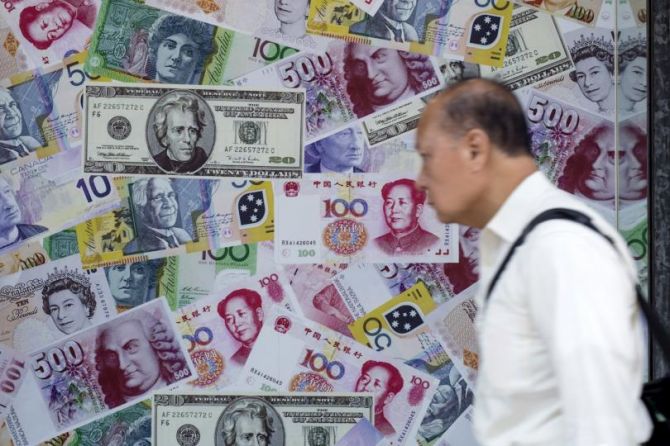One can expect that within a decade, global commodity markets will be priced in the yuan - today they are all dollar-denominated, says AV Rajwade.
 Last week, the International Monetary Fund (IMF), in its quinquennial review of the composition of the Special Drawing Rights (SDR) basket, decided to include the Chinese yuan in it.
Last week, the International Monetary Fund (IMF), in its quinquennial review of the composition of the Special Drawing Rights (SDR) basket, decided to include the Chinese yuan in it.
The basket currently comprises the dollar, the euro, the pound and the yen. The yuan will have the third-highest weight after the dollar and the euro.
This recognition of the yuan is well deserved, given that China is the world's second-largest economy at nominal exchange rates (largest in terms of purchasing power parity), as also the world's largest exporter and cross-border trader.
It also holds the world's highest reserves at around $3.5 trillion.
A few years ago, it was agreed that the IMF quotas (which determine the borrowing powers of member countries) of some of the large emerging economies, including India and China, would be increased.
The proposal remains stalled in the US Congress.
As Eswar Prasad, Tolani senior professor of trade policy at Cornell University and a senior fellow at Brookings Institution, commented after the IMF decision:
"The RMB's elevation to the club of global reserve currencies is a big step for China and a significant one for the international monetary system. (RMB is the short form for the other name of the Chinese currency, namely Renminbi). It is a historic moment in international finance for an emerging market economy, with a per capita income barely a quarter that of other reserve currency economies, to be anointed as the issuer of one of the world's major reserve currencies."
To be sure, SDR is not "money" in terms of two of the three standard definitions - medium of exchange and store for value.
It is, however, the unit of account for several multilateral organisations including the IMF.
Therefore, the yuan's inclusion in the basket has more symbolic significance than practical implications: but it now becomes a recognised reserve currency.
For several years the Chinese authorities have been taking steps to internationalise the use of the yuan.
The "long march" started with encouraging Chinese importers and exporters to price cross-border transactions in the home currency: at present, about 25 per cent of China's trade is invoiced in the yuan and analysts expect the proportion to go up to 50 per cent in the next five years.
It is already the world's fourth-largest traded currency in the global foreign exchange market, having overtaken the Japanese yen recently.
As for the capital account, China has encouraged an offshore deposit/loan market in the currency in Hong Kong. Other international financial centres such as London and Singapore are offering similar facilities.
China has permitted several foreign entities to float yuan-denominated bonds in the domestic market - and several Chinese entities including the central bank itself have floated yuan-denominated bonds in the offshore market.
Already an estimated 70 central banks are holding part of their reserves in the Chinese currency, many of them through currency swaps with the People's Bank of China.
The Chinese authorities recently removed all restrictions on foreign central banks and multilateral organisations on trading in the domestic yuan bond market, already the world's third-largest. One can also expect that within a decade, global commodity markets will be priced in the yuan - today they are all dollar-denominated.
The basic economic logic is simple: China is the world's largest buyer and, in other cases, producer of many commodities. (One reason for the recent fall in global commodity prices is slowing growth in China.)
It would be natural therefore, if the pricing currency changes in course of time.
The inclusion in the SDR basket is, however, unlikely to bring about a change in the managed exchange rate policy China has been following for a long time. To quote the deputy governor of the central bank, "Our attitude towards the exchange rate won't change but our market reforms will continue non-stop...."
Clearly, the Chinese authorities understand the importance of the exchange rate to the domestic economy.
For a longer perspective, back in the 19th century and right up to World War I, including in the era of the gold standard, the British pound was the principal global currency; the dollar took over the role after the end of World War II. We may well see that role being passed on to the Chinese yuan in the 21st century.
Two economists bullish on China becoming the dominant economic power are Arvind Subramanian and Martin Jacques, authors respectively of Eclipse: Living in the Shadow of China's Economic Dominance and When China Rules the World.











